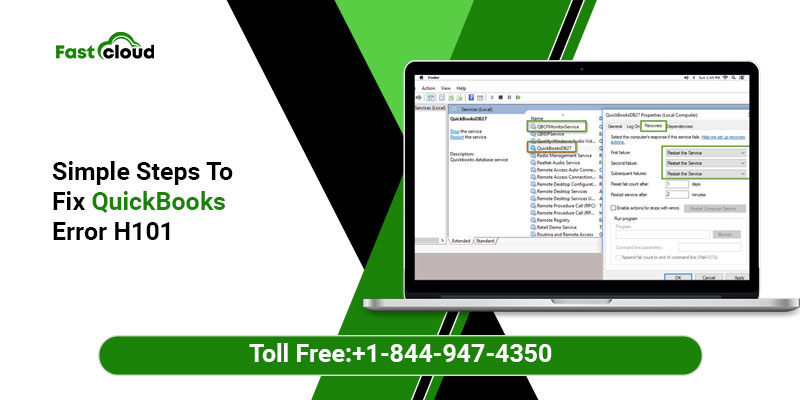QuickBooks is a commonly used bookkeeping tool that allows users to track transactions efficiently and quickly. Despite the fact that QuickBooks is the ideal bookkeeping software, it might be slowed down by particular interferences at any time. This issue occurs when a PC-based organization document requires additional configuration.
This blog will demonstrate the procedures to be performed in order to assess QuickBooks Support. Currently, we must first understand the causes of the H101 error in QB before learning how to resolve a similar error.
What Causes Quickbooks Error H101 to Wreak Havoc on Your Computer?
We’ll discover all of the possible causes for the QuickBooks error H101 notice to appear on the screen:
- In the event that your DNS settings are incorrect.
- QuickBooks administrations are yet to begin.
- Firewalls, for example, may restrict access to the PC where the organization’s document is stored.
- Because of QuickBooks Software’s ill-advised installation.
- When QuickBooks Online Support fails to obtain the PC’s Internet Protocol (IP) address.
- To access the organization’s documents, you must get through the firewall squares.
You can now get the solutions to the questions about the QuickBooks Error H101.
Easy Ways To Fix QuickBooks Error H101
When the client needs to have an association between the organization records and friends work area and is unable to communicate with the server, Error H101 occurs.
Technique 1:
- Specialist in QuickBooks document management.
- If you need to get rid of QuickBooks error codes, you can download the QuickBooks document specialist for your PC. It will assist you in clearing the framework of all H arrangements and multi-client errors.
- If you haven’t dealt with the blunder codes yet, now is the time to do so.
Technique 2:
- You’ll use this strategy to get to the host and admins.
- To verify the facilitating, do the following:
- On each facilitating PC, open the QuickBooks Online Accountant programming, then open the document and go to utilities.
- Check the list of PCs for a host of multi-client access and work on the other PC.
- Currently, the organization document must be displayed behind a closed window.
- Check the administration and facilitating for this error.
- In your PC framework, begin the QuickBooks DBXX and QBCF screen administrations.
- Look for the QuickBooks DBXX Service in the administrator box and turn it on.
- If you are unable to see the QuickBooks DBXX administration, you will need to install the database server administrator. To complete the program, you must first open QuickBooks and have a watch that allows you to do so.
- Take into account turning on the QuickBooks DBXX support and the administration status will begin.
- Press on recovery and restart your framework; this will, in turn, mend the administration if it fails to do so, and then repeat the procedure for the subsequent disappointment.
- Currently, you must open QuickBooks on all of your workstations.
Technique 3:
- Make a second organizer for the record and make it available to everyone.
- Make a new envelope in the facilitPresently, duplicate the.qbw record in it.
- Finally, to open the organization record in multi-client mode, you must check out.
- If the issue hasn’t been resolved yet, try the solution offered below.
Technique 4:
- In this method, all you have to do is add or modify the server in the Windows have record.
Technique 5:
- Use new ports to communicate the firewall’s design.
- Currently, I need to delete the AVG application in order to alter the Windows Defender that comes standard with Windows 8. If you have any questions about the AVG program, you can contact the AVG direct supplier, or if you want to keep up with the AVG programming, you can contact the AVG direct supplier. On each PC, take the following steps:
- Find a link between the Windows firewall and the settings.
- Select ports and press them immediately.
- TCP should be selected from the list of local ports.
- Working. Fill in the name in the name field and click Finish.
- Rehash all of the above advancements for inbound standards.
